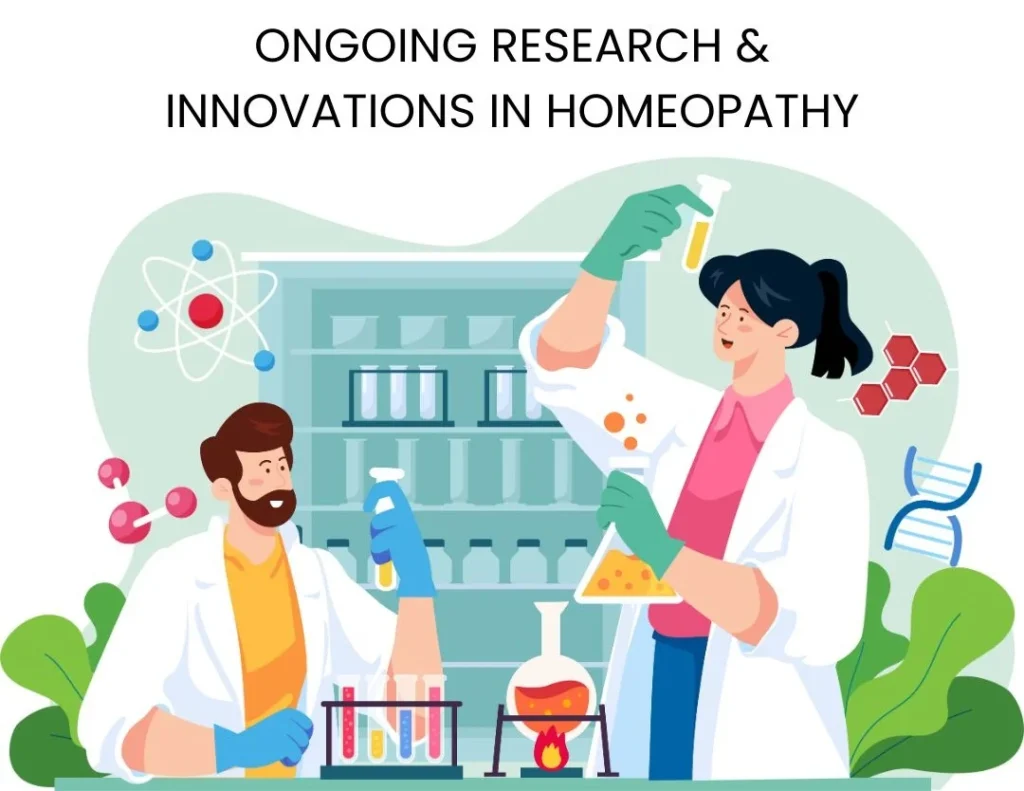Homeopathy, a holistic system of medicine developed over two centuries ago, continues to evolve through scientific research and technological advancements.
Once considered a traditional practice, homeopathy is now intersecting with modern science, offering new insights into its mechanisms and applications.

Table of Contents
Toggle🔬 1. Scientific Research Validating Homeopathic Remedies
Homeopathy has often faced scepticism due to its use of highly diluted substances.
However, recent studies have begun to shed light on the potential mechanisms behind its efficacy.
THE SCIENCE BEHIND HOMEOPATHY: HOW IT WORKS & WHY SOME DOCTORS TRUST IT
Nanoparticles in Remedies
Research indicates that homeopathic remedies may contain nanoparticles of the original substances, even at high dilutions.
These nanoparticles could interact with the body’s biological systems, potentially explaining the therapeutic effects observed in clinical practice.
Biological Models
Studies have demonstrated the effects of homeopathic remedies on various biological models, including plants, bacteria, and animal systems.
Some remedies have shown significant anti-inflammatory, antiviral, and immunomodulatory effects in laboratory settings.
Clinical Trials
While more extensive research is needed, several double-blind, placebo-controlled trials have reported positive outcomes in managing conditions such as allergies, migraines, depression, and childhood infections.
For instance, a 2020 study published in the journal Homeopathy found statistically significant improvements in chronic sinusitis patients treated with individualized remedies compared to a placebo group.
🧠 2. Innovations in Case-Taking and Analysis
Traditional homeopathic case-taking relies heavily on detailed patient interviews and symptom analysis.
Modern technology is now enhancing this process, making it more efficient and precise.
AI-Powered Case Analysis Tools
Artificial Intelligence (AI) is being integrated into homeopathic practice through tools that assist in remedy selection and repertorization.
These AI systems analyze patient data, identify patterns, and suggest potential remedies, supporting practitioners in their decision-making process.
Voice & Emotion Recognition
Emerging technologies are exploring the use of AI to interpret patient voice tones, pauses, and emotional cues during consultations.
This could provide deeper insights into a patient’s mental and emotional state, aiding in more accurate remedy selection.
Symptom-Tracking Apps
Mobile applications now allow patients to log symptoms, track changes over time, and share this information with their practitioners.
This real-time data collection enhances the monitoring of treatment progress and remedy effectiveness.
🌍 3. International Collaborations & Research Funding
Global interest in homeopathy is growing, leading to increased collaboration and funding for research initiatives.
The Ministry of AYUSH in India has established the Central Council for Research in Homeopathy (CCRH), which funds both clinical and fundamental research projects.
Europe
Countries like France, Germany, and Switzerland support integrative research through public-private partnerships, aiming to validate and integrate homeopathy into mainstream healthcare.
In Brazil and other South American countries, universities and health institutions are conducting research on the use of homeopathy in epidemic management and public health applications.
WHY HOMEOPATHY IS GAINING POPULARITY WORLDWIDE
🧪 4. Laboratory & Cellular Studies: Bridging the Gap
To align with modern medical standards, scientists are investigating how homeopathic remedies affect cells, tissues, and biochemical pathways.
Gene Expression Studies
Certain homeopathic remedies have been shown to influence gene regulation in cell lines, offering potential insights into their epigenetic effects.
Anti-Cancer Investigations
Laboratory studies suggest that remedies like Carcinosinum, Thuja, and Conium may exhibit anti-proliferative effects on cancer cell lines.
While these findings are preliminary, they open avenues for further research into homeopathy’s role in cancer care.
Immunology & Inflammation
Remedies such as Arnica montana and Belladonna are being tested for their effects on cytokine production and inflammatory pathways, potentially contributing to the management of inflammatory conditions.
📱 5. Digital Transformation in Practice Management
Homeopathic practitioners are embracing digital tools to enhance practice management and patient care.
Online Consultations & Telehealth
The rise of telehealth platforms has made homeopathic consultations more accessible, allowing practitioners to reach patients globally.
Digital Repertorization Software
Software applications streamline the process of remedy selection by organizing and analyzing patient symptoms, making the process more efficient and accurate.
Electronic Health Records (EHR) Integration
Some homeopathic clinics are adopting EHR systems tailored to their practice, improving documentation, patient tracking, and outcome analysis.
🌟 6. Innovations in Remedy Preparation
Advancements in technology are leading to new methods of preparing homeopathic remedies, aiming to enhance their stability and efficacy.
Nanoparticle-Based Delivery Systems
Researchers are exploring the use of nanogels, liposomes, and biosensors to deliver homeopathic remedies more effectively within the body.
Quality Control via Spectroscopy
Techniques like Nuclear Magnetic Resonance (NMR) and UV-Visible spectroscopy are being employed to ensure the quality and consistency of homeopathic remedies.
🧘🏽♀️ 7. Integrative & Evidence-Based Homeopathy
The trend towards integrative healthcare is leading to the inclusion of homeopathy alongside conventional treatments.
Integrative Clinics & Research Centers
Hospitals in various countries are incorporating homeopathy into cancer care, post-operative recovery, and chronic pain management, reflecting a holistic approach to patient care.
Evidence-Based Homeopathy (EBH)
Practitioners are encouraged to document cases with measurable outcomes, contributing to a growing body of evidence supporting homeopathic treatments.
HOW DOES HOMEOPATHY WORK? THE SCIENCE BEHIND POTENTIZATION
🌐 8. Global Health Applications
Homeopathy is being utilized in public health initiatives worldwide, particularly in managing epidemics and supporting primary care.
Epidemic Management
Countries like Brazil and Cuba have implemented homeopathic interventions during epidemics, observing positive outcomes in disease management.
Supportive Care in Pandemics
Studies have explored the role of homeopathy as an adjunct therapy during the COVID-19 pandemic, with early reports suggesting benefits in symptom reduction and immune support.
HOMEOPATHY IN DIFFERENT COUNTRIES: A GLOBAL PERSPECTIVE ON HEALING
💬 Final Thoughts: The Path Forward
Homeopathy is undergoing a transformation, integrating traditional principles with modern scientific research and technological innovations.
While challenges remain, the ongoing efforts to validate and enhance homeopathic practice are paving the way for its broader acceptance and application in global healthcare.
